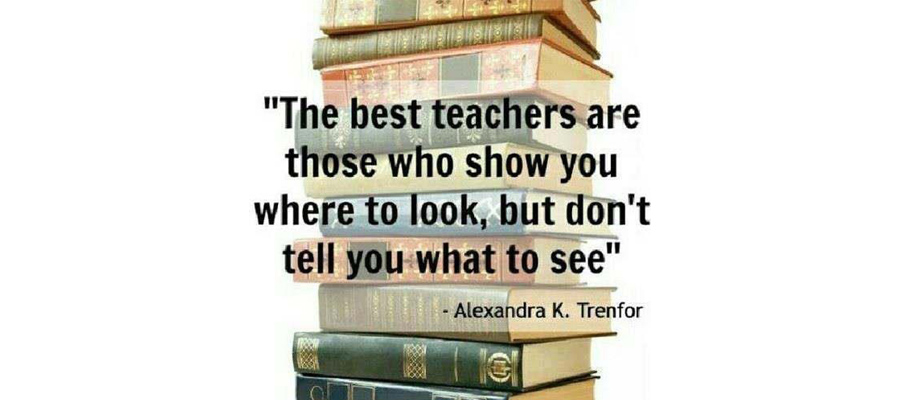‘The best teachers are those who show you where to look, but don’t tell you what to see’
Alexandra K Trenfor
My friend sent me this quote on Friday just as I arrived at International School of Storytelling to lead a workshop, In Heart and Mind, for people who work with and for children. What perfect timing, not only because I was able to share it with the wonderful group with whom I explored stories all weekend, but also because I have been ruminating on the word ‘Teacher’, for a couple of weeks now.
The word, concept, actuality of ‘Teacher” brings up a huge bag of emotions in me. I immediately picture the bullying, dominant teachers of my childhood – the ones who drove the wit out of me, who terrified me so much by throwing chalk board wipers across the classroom that I wasn’t able to times 8 x 4. To this day I freeze at the simplest additions or subtractions when under pressure. There is another image that springs to mind, almost the polar opposite. A Mr Chips-like teacher (of which my father was one) and in my case, a Miss Chips teacher – Miss Dittmar, who looked on me fondly, and saw something that was worth drawing out.
As an adult I have often been asked “are you a teacher?’ and I have mostly heard this as an insult – that I have the traits of being bossy, overbearing and dominant. Ironically I see that teaching is actually one of the noblest of professions, probably one of the most important jobs that anyone could ever do. Again I am confronted with this paradox in my relationship to teacher. This confusion seems to be one that is shared by others. We look up to teachers and, even as adult, search for people to lead and guide us. Yet the teachers who lead of our children, helping them to grow into their full potential, are underpaid, and ignored when it comes to policy. It is as we look down on the profession.
I wonder, if I do hold the archetype of ‘teacher’ in me, how I can embody this quality in a way that satisfies me and is useful to others?
I believe being a teacher requires strength, courage and great consciousness. Additionally I feel that humility is required if we are to be a guide. All good leaders are also servants. I think there is an ‘old order’, a way that has been accepted as the norm for a long time, out of this sprang the teachers of my childhood. But there is also a ‘new way’, teachers who are inspirational, full of knowledge and wisdom that they want to share. They too have been around for a long time, but they spring from a different paradigm. One of the most important differences, it seems to me, is the ability to truly see and hear others, to reach out to understand the ‘other’. This is not strict, punishing and controlling. It is not “do as I say, not as I do” but rather it is the ability to hold the group and to really care for them.
The word ‘Educate’ is derived from the latin, to lead forth or to take out. This, I am coming to discover, is what a true teacher does, they seek out the qualities and expressions inside their ‘pupil’ and support the development of that person. The best teachers encourage us to grow, they show us where to look but they don’t tell us what to see.
To be a teacher is to accept a great responsibility. To continue our own self development whilst finding it in our hearts to deeply and truly love those in our care.
What does teaching mean to you? What is your experience of ‘teacher’? I would love to hear your stories if you fancy sharing them with me
